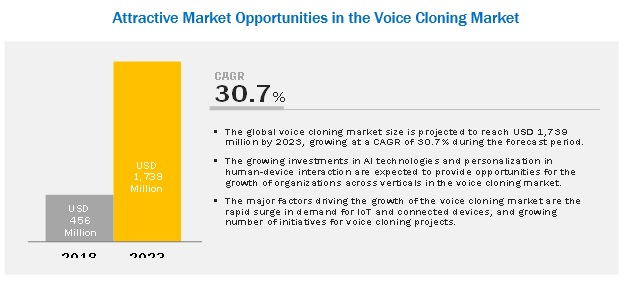The voice cloning technology
takes various voice samples as an input to produce more natural sounding output of human voice. These solutions
nowadays are being integrated with the Artificial Intelligence (AI) technology to
minimize the time required to clone samples. Voice cloning solutions are
expected to gain traction across various verticals to deliver a personalized experience to users.
 |
| Voice Clonning Market |
Major vendors in the voice
cloning market include Google (US), Microsoft (US), IBM (US), AWS (US), AT&T
(US), Baidu (China), Nuance Communications (US), iSpeech (US), NeoSpeech (US),
CereProc (Scotland), Cepstral (US), Lyrebird (Canada), Kata.ai (Indonesia), alt
Inc. (Japan), Aristech GmbH (Germany),
Acapela Group (Belgium), VocaliD (US), Voicery
(US), Voctro Labs (Spain), exClone (US), CandyVoice (France), LumenVox (US),
rSpeak (Netherlands), Smartbox Assistive Technology (UK), and VivoText (Israel).
Major players in the global voice
cloning market have adopted various growth strategies to expand their presence
across the globe. These vendors have been majorly following strategies, such as new product launches and
partnerships, from 2016 to 2018, which helped them achieve a good position and
broaden customer base in the voice cloning market.

In line with the rising developments
in the voice cloning technology, Baidu has been working to deliver innovative
voice cloning solutions to its customers. The company is majorly focused on Research
and Development (R&D) initiatives in the voice cloning technology to create
more natural sounding speech samples. For instance, in February 2018, the
company upgraded its voice cloning solution called Deep Voice. The up-gradation to its Deep Voice solution would enhance the system’s AI capabilities by
cloning a human voice in minimal time.
Another market leading
company, Google is following various growth strategies to strengthen its
presence in the global market. Google offers cloud-based Application
Programming Interface (API) to convert text into the speech form. These cloud-based
APIs include AI and Machine Learning (ML) capabilities to help developers create a natural sounding speech with 30 voices. The product launches and
enhancements is the key strategy adopted by the company in the
voice cloning market. This is evident
from the fact that, Google, in March 2018, launched an AI voice synthesizer
named Cloud TTS for developers. This launch
would help businesses and developers add voice synthesis capabilities into
chat bots, websites, and other applications.
Voice cloning technology is expected to scale up in the fast-paced environment that we live in. Also, companies are now using speech-to-speech voice conversion technology to deliver more dynamic output, and do not have a robotic, non-emotional delivery. Hence, it provides a better approximation of the complexities inherent in human speech in just 5 to 10 minutes.
ReplyDelete